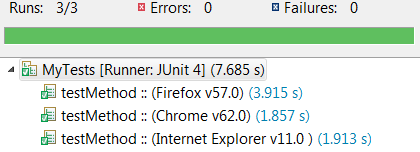-
Notifications
You must be signed in to change notification settings - Fork 11
Multi browser support
Multi browser support enables you to execute your test with different browser configurations. Notice the @Browser annotation in the example below. The string references a specific browser configuration (see Browser configuration).
You also can @SuppressBrowsers which will disable multi browser for the method or class. Be aware that @SuppressBrowsers on a class can be overridden on method scope by annotating a @Browser to a method.
@RunWith(NeodymiumRunner.class)
@Browser("Firefox_large")
@Browser("Chrome_large")
@Browser("InternetExplorer_small")
public class MyTests
{
@Test
public void testMethod()
{
// implementation
}
@Test
@SuppressBrowsers
public void noBrowserTest()
{
}
}On execution each @Test method will be automatically executed with each annotated browser configuration.
Neodymium creates the browser instance according to the configuration, injects the resulting web driver in Selenide framework and clear them up afterwards.

BTW: The @Browser annotation can be inherited from a parent class and if needed you can overwrite it in the test class.
The browser behavior describes how the browser in general conducts during test. There are a couple of properties that you can use to alter that.
| Property | Description |
|---|---|
| neodymium.webDriver.reuseDriver | a boolean property indicating whether to use a single driver instance for all tests (defaults to false) |
| neodymium.webDriver.keepBrowserOpen | a boolean property indicating whether to keep browser open after test has finishedNOTE: The webdriver process might stay alive even if you close the browser afterwards |
| neodymium.webDriver.keepBrowserOpenOnFailure | a boolean property indicating whether to keep the browser instance open only if the test failsNOTE: The webdriver process might stay alive even if you close the browser afterwards |
Browser configurations are stored in the file config/browser.properties
Since it is a property file a special format is needed to define a configuration.
Format: browserprofile.<configuration tag>.<property>
-
browserprofileis a static prefix that must be used for every configuration. -
<configuration tag>is a user defined string that is later on used to be referred with@Browserannotation
NOTE: This
<configuration tag>must not contain any white space characters. Also it's treated case sensitive.
-
<property>is one of the listed below
| Property | Mandatory | Description |
|---|---|---|
| name | YES | is a more detailed name of this browser/device test. This name will be used for reporting |
| browser | YES | determines what browser will be used for this test. Valid values are iphone, ipad, android, firefox, chrome, internetexplorer, safari
|
| version | YES if used for device emulation | determines which version of the browser should be used OR determines the version of the OS of an emulated device by default version references the browser version, but in case of saucelabs device emulation usage it may be used for the OS version instead |
| browserResolution | NO | determines width and height of the browser window. If not specified the default will be used instead not applicable for mobile device emulation can be defined as e.g. 1200x900 or 1200X900 or 1200,900
|
| screenResolution | NO | determines width and height of the emulated operating system only applicable for Windows, Linux and MacOS devices can be defined as e.g. 1280x1024 or 1280X1024 or 1280,1024
|
| platform | NO | defines on which (emulated) platform the test should run. See SauceLabs Platform-Configurator for further more information |
| deviceOrientation | NO | defines the screen orientation. only for mobile/tablet device emulation valid values: portrait or landscape
|
| testEnvironment | NO | determines where the testcase will be executed. possible values are local and saucelabs. NOTE: you only need to set this property if you want to use saucelabs as test environment. by default the value local is assumed. |
| chromeEmulationProfile | NO | A special property that contains a device name that should be emulated. This property is for chrome only. See chrome device emulation features for valid strings. NOTE: Currently are only from chrome predefined devices supported. |
| pageLoadStrategy | NO | This property defines when the web driver will return from a page load. Value can be normal, eager or non
|
| headless | NO | Boolean propertey that determines if the browser should run in headless mode. Default value is false. NOTE: Currently only supported for Firefox and Chrome |
| acceptInsecureCertificates | NO | A boolean property that decides whether the web driver accepts insecure certificate or not. The default behaviour is the one of the used web driver.
|
| arguments | NO | Additional command line arguments for the browser to apply. As you can specify only on 'arguments' property for a browser at a time you need to chain multiple arguments |
# latest Google Chrome local in 1600x1200
browserprofile.Chrome_1600x1200.name = Chrome 1600x1200
browserprofile.Chrome_1600x1200.browser = chrome
browserprofile.Chrome_1600x1200.browserResolution = 1600x1200
# latest Firefox local in 1500x1000
browserprofile.Firefox_1500x1000.name = Firefox 1500x1000
browserprofile.Firefox_1500x1000.browser = firefox
browserprofile.Firefox_1500x1000.browserResolution = 1500x1000Overview
Neodymium features
- Neodymium configuration properties
- Neodymium context
- Utility classes
- Test data provider
- Test Environments
- Multi browser support
- Applitools Plugin
- Localization
- Highlight and Wait
- Advanced Screenshots
- Seperate Browser Sessions for Setup and Cleanup
- Reporting
- Accessibility Testing
Best practices and used frameworks
Special